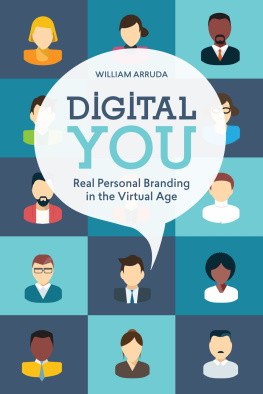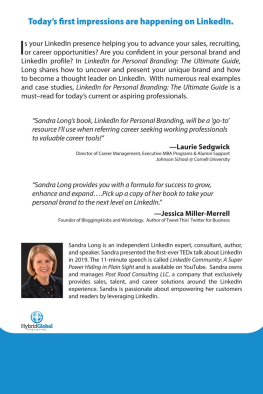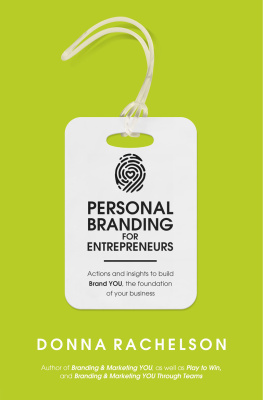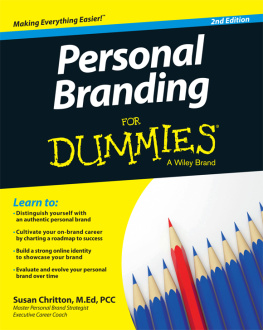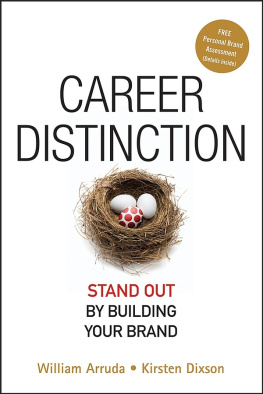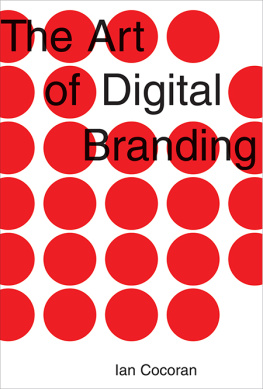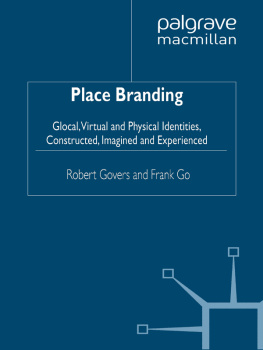William Arruda - Digital You. Real Personal Branding in the Virtual Age
Here you can read online William Arruda - Digital You. Real Personal Branding in the Virtual Age full text of the book (entire story) in english for free. Download pdf and epub, get meaning, cover and reviews about this ebook. year: 2019, publisher: Association for Talent Development, genre: Business. Description of the work, (preface) as well as reviews are available. Best literature library LitArk.com created for fans of good reading and offers a wide selection of genres:
Romance novel
Science fiction
Adventure
Detective
Science
History
Home and family
Prose
Art
Politics
Computer
Non-fiction
Religion
Business
Children
Humor
Choose a favorite category and find really read worthwhile books. Enjoy immersion in the world of imagination, feel the emotions of the characters or learn something new for yourself, make an fascinating discovery.
- Book:Digital You. Real Personal Branding in the Virtual Age
- Author:
- Publisher:Association for Talent Development
- Genre:
- Year:2019
- Rating:3 / 5
- Favourites:Add to favourites
- Your mark:
- 60
- 1
- 2
- 3
- 4
- 5
Digital You. Real Personal Branding in the Virtual Age: summary, description and annotation
We offer to read an annotation, description, summary or preface (depends on what the author of the book "Digital You. Real Personal Branding in the Virtual Age" wrote himself). If you haven't found the necessary information about the book — write in the comments, we will try to find it.
Digital You. Real Personal Branding in the Virtual Age — read online for free the complete book (whole text) full work
Below is the text of the book, divided by pages. System saving the place of the last page read, allows you to conveniently read the book "Digital You. Real Personal Branding in the Virtual Age" online for free, without having to search again every time where you left off. Put a bookmark, and you can go to the page where you finished reading at any time.
Font size:
Interval:
Bookmark:


2019 ASTD DBA the Association for Talent Development (ATD)
All rights reserved. Printed in the United States of America.
22 21 20 19 1 2 3 4 5
No part of this publication may be reproduced, distributed, or transmitted in any form or by any means, including photocopying, recording, information storage and retrieval systems, or other electronic or mechanical methods, without the prior written permission of the publisher, except in the case of brief quotations embodied in critical reviews and certain other noncommercial uses permitted by copyright law. For permission requests, please go to www.copyright.com, or contact Copyright Clearance Center (CCC), 222 Rosewood Drive, Danvers, MA 01923 (telephone: 978.750.8400; fax: 978.646.8600).
ATD Press is an internationally renowned source of insightful and practical information on talent development, training, and professional development.
ATD Press
1640 King Street
Alexandria, VA 22314 USA
Ordering information: Books published by ATD Press can be purchased by visiting ATDs website at www.td.org/books or by calling 800.628.2783 or 703.683.8100.
Library of Congress Control Number: 2019945723
ISBN-10: 1-949036-75-8
ISBN-13: 9781949036756
e-ISBN: 9781949036763
ATD Press Editorial Staff
Director: Sarah Halgas
Manager: Melissa Jones
Community of Practice Manager, Career Development: Lisa Spinelli
Developmental Editor: Kathryn Stafford
Production Editor: Hannah Sternberg
Text and Cover Design: Michelle Jose
Printed by Versa Press, East Peoria, IL
That headline might seem hereticalnot to mention self-defeatingcoming from me, a pioneer in the field of personal branding.
But its true.
At least, its true that the concept of personal branding as we once defined it has no more life in it. Its no longer relevant. Its nothing more than a relic.
RIP old personal branding.
We didnt know it then, but analog personal branding was a mere prototype for the glorious, global, digital branding machine that todays workforce is learning to operate.
But before we lay to rest the personal branding of yesterday, lets take a trip down memory lane (at warp speed).
The idea of personal branding was not an instant hit. Take it from me. I was there at the beginning. Personal branding simmered for many years and was predicted to be little more than a passing fad. When Tom Peters coined the term back in 1997, few people knew what it meant, and even fewer were interested in building their brand.
The acceptance of personal branding was slow because the circumstances that require it hadnt fully formed. Just eight years after Tom Peterss prophetic article, The Brand Called You, was published, the magazine that featured it on its coverFast Companydecided that they had made a mistake. They declared personal branding dead before any life was ever breathed into it (Lidsky 2005). And its true, in 2005 professionals werent feeling stressed about their long-term career prospects and most people still worked alongside their colleagues in corporate towers or suburban office parks. The Internet was in its infancy. And the product that changed how we communicate, the iPhone, didnt make its debut until 2007. It wasnt until 2014 that the Internet was accessible in 80 percent of U.S. homes, according to the U.S. Census Bureau.
But rapid changes in the global marketplace, combined with multiple, serious downturns in the economy, led career-minded professionals to start taking notice of the potential for personal branding to serve as a career management strategy. From there, even if they didnt know exactly what it is, executives realized that having a brand is an essential career asset that can help them reach their goals. And companies got in on the act, too. Most major corporations have adopted personal branding programs into their talent development initiatives. My company alone supports 20 percent of the Fortune 100 and dozens of global brands, associations, and institutions.
Ironically, now that personal branding has made it to the big league, theres talk that the personal branding revolution is over. I hear about it all the timefrom the press and career coaches to HR executives. Its true that pseudo-branding has lost its cachet, but the new era of digital personal branding is not only thriving but vital to success.
Let me set the record straight by describing three reasons why naysayers have muddled the truth about the personal branding revolution, which I can assure you is alive and well.
1.Message overload. Youre inundated with messages all day long: ads, emails, app alerts, texts, tweets. Its easy to think that personal branding is next to impossible now that the roar of the crowd is almost deafening. But silence is not the answer. Quite the opposite. Todays tools for digital personal branding provide clever ways to differentiate yourself, presenting your valuable message to the right people at the right time. The same tools that caused Information Age overload can help you rise above the roar and get noticed when you use them effectively.
2.Misunderstanding. Many people confound personal branding with self-promotion, bragging, or manufactured pristine personas created by a self-centered generation. The term personal branding has become hijacked by those who associate it with mindless, endless online chatter and the grandiose desire to be visible, known, and popular. Equating personal branding with social media excess has distorted the true value of personal branding. Personal branding is not a TMZ story about the Kardashians. And its certainly not about visibility for the sake of being visible. In fact, personal branding is not about you. Its about how you deliver value to others.
3.Myopia. Ironically, the third reason some people think personal branding is dead is related to the rise of virtual employees. Companies, once reluctant to let their people work from home for fear that they would goof off, are now becoming proponents of remote work. They are encouraging their employees to keep away from the office; in a 2015 Gallup study, the number of American workers who have telecommuted climbed to 37 percent. The cost savings to companies are just too big to ignore. But as work becomes more virtual, employees often have the erroneous belief that theyre free from having to brand themselves because their work will speak for itself. Without the distraction of face-to-face chats at the coffee station, the quality of the work takes center stage, right? Nothing could be further from the truth. We all know the old adage: out of sight, out of mind. Virtual employees have to work harder to be relevant and remain top-of-mind. They must use new ways to visibly demonstrate their value. Being virtual can mean being invisible, and digital personal branding is the solution.
Personal branding has taken on a completely new life since the days when it was only being used by senior execs in large corporations. Today, college students are using it to stand out so they can land internships. Some universities have added branding courses to their curriculum. Even high school students are perfecting their LinkedIn profiles to help them secure a spot in the college of their choice.
In my own business, I can see how it has become a thread seamlessly woven into the fabric of career management. In 2018, my company signed on eight new corporate clients for personal branding programs (two of them rank in the top 10 places to work). My companys personal branding certification programs (now delivered by Career Thought Leaders) had near-record attendance, and the number of Google alerts I received on the term
Font size:
Interval:
Bookmark:
Similar books «Digital You. Real Personal Branding in the Virtual Age»
Look at similar books to Digital You. Real Personal Branding in the Virtual Age. We have selected literature similar in name and meaning in the hope of providing readers with more options to find new, interesting, not yet read works.
Discussion, reviews of the book Digital You. Real Personal Branding in the Virtual Age and just readers' own opinions. Leave your comments, write what you think about the work, its meaning or the main characters. Specify what exactly you liked and what you didn't like, and why you think so.

